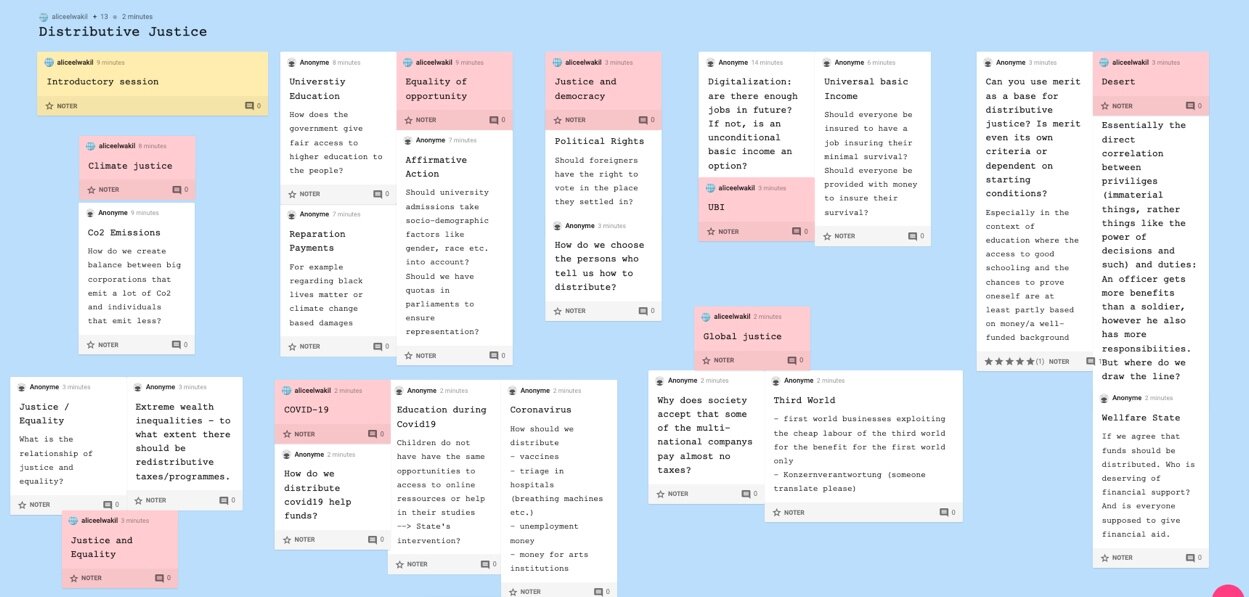Introduction by the editors
Who ought to get what, when, and why? This general question is at the core of theories of distributive justice. It was also at the center of students’ discussions in the Bachelor seminar “Distributive Justice” at the University of Zurich in the Fall Semester 2020.
Between September and December 2020, and for the first time online only due to the Covid-19 pandemic, we met with 34 students for 1.5 hours on a weekly basis. Our sessions were devoted to exchanges concerning a list of standard texts to discover and clarify various ways in which contemporary political philosophers have defined how advantages and burdens should be distributed, whether and when inequalities are justifiable, and what just institutions or policies look like – among other things.
We also paid attention to the implications of these various theories to understand and evaluate many areas of contemporary social and political life. These rich exchanges were in part motivated by the final assignment for the seminar: write, in small groups of 2 to 3 students, a blog post on a question of their choice that could be published on “Philosophie.ch – Swiss portal for philosophy.” The present symposium gathers a selection of these posts.
The writing process was structured in 3 phases, in parallel to the seminar’s program:
1. The first phase started with the very first session, in which students were invited to list the questions related to the topic of distributive justice that they thought were the most urgent or relevant to discuss. Several general topics already started emerging – highlighting both the diversity of questions related to distributive issues and students’ most pressing concerns. This first phase also enabled participants in the seminar to identify other students with similar interests and to form blog post groups.

2. Over the next few weeks of the semester, students were asked to develop a clear question and to present a preliminary outline for their blog post. This second phase closed in session 8, in which students offered presentations of this preliminary work and obtained oral and written feedback from their peers and from us to inform their next steps.

3. The third phase consisted in writing of the blog posts. The writing process was structured to enable students to give and receive feedback twice – once on the first version of their posts by their peers and us, another time on the penultimate version of their posts by their peers.
A fourth phase of editing and revising the blog posts based on our comments and suggestions for edits took place after the end of term.
All the students who participated in the seminar deserve praise for their critical engagement with the readings and in class discussions, for providing constructive and helpful feedback to their peers, and for finding ways to relate their own concerns with the general theories of political philosophy we studied this term – all while having to stay apart, in very suboptimal conditions, because of sanitary measures.
Participants to the B.A. seminar “Distributive Justice”
Marco Albani, Iwan Alijew, Lauren Barnes, Pascal Baumann, Sarah Berkinshaw, Samuel Brunner, Jeanne Cordy, Gabriel Egli, Sajedeh Farajzadehjalali, Denis Ferster, Laura Fischer, Nicolà Fritz, Dominik Roger Gross, Tim Hofer, Maurin Huonder, Louisa Kaufmann, Michelle Keppler, David Kobelt, Selina Kocagöncü, Lara Koch, Johanna Kroha, Matthieu Monnot, Thomas Percy, Max Rabinovich, Medea Schneider, Aaron Siebs, Cornel Spielmann, Dimitri Steiger, Céline Strüby, Joe Winzenried, Dominik Zakrzewski
We wish to thank them for making this term so enjoyable, and for accepting with such enthusiasm the challenge of making some of our debates accessible to a wider audience through the publication of blog posts.
We ask readers to keep in mind that these blog posts have been written by students, many of whom discovered theories of distributive justice for the first time in this seminar. This means that experienced readers might find occasional mistakes or idiosyncratic interpretations of classical texts. We hope they will mainly see why we think that these blog posts have great value: they present the problems of distributive justice that preoccupy today’s philosophers in the making.
Papers
- Should benefits and burdens be distributed according to merit? - Lauren Barnes and Max Rabinovich
- The justice of education systems - Iwan Alijew and Sarah Berkinshaw
- Political liberty - Pascal Baumann and Lara Koch
- Reparations, rightful ownership and recognition - Jeanne Cordy, Tim Hofer and Michelle Keppler
